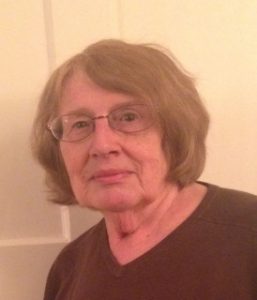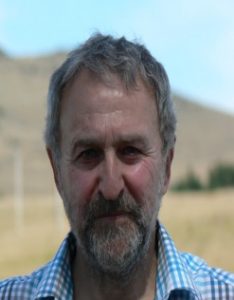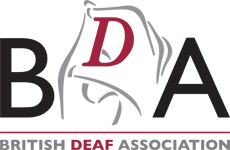Personal experiences – schools for the deaf
A feature of this website is the inclusion of personal experiences of the topic under consideration. This makes it possible to include different perspectives, including accounts from professionals and consumers, and different views on decisions that have been made.
We welcome these contributions at any time, and guidance for contributors is given in the ‘overview of the project‘ section.
We are also happy to include here links to signed contributions.
Index
Innocents of Oppression – Nick Sturley
Parents talking about their children’s experiences of school for the deaf in the 1960s – Susan Gregory
Starting school in the 1950s – Christine Monery
Tim Silvester, Principal from 1991-2005 and previously Head of Services for Deaf and Hearing Impaired Children in Derbyshire

Nick Sturley was born in 1967, is Deaf, uses BSL, and has Usher which is a visual condition.
The following excerpt is taken (with permission) from his novel of the same title. It is very closely based on his own and others personal experiences of schools for the deaf in the 1970s and 1980s (Nick Sturley, Innocents of Oppression, published by Action Deafness Books, Leicester, 2012)
(Aaron is a new boy at a school for the deaf and has become friends with Chris).
Chris explained that assembly started at nine o’clock every day, except at weekends; all boys had to be on time for it. He also said that all boys had to stand up when the headmaster came in, and sit down when he got to his lectern on the stage. Chris sat on an empty chair at the end of the second row while Aaron sat on the second one in the first row. He sat between Bradley Watts, whom he knew came from Ipswich, and the Scot, Derek Ferguson. Soon enough, he felt a tap on his shoulder and saw that Chris was standing up, along with everyone else. He and his form mates rose to their feet. Behind Chris, he saw Mr Langston enter the hall at the back, and watched him walk along the aisle on the right, towards the stage. He was carrying a dark blue ring binder. The headmaster walked past Aaron, climbed the short staircase and arrived at the lectern. Aaron quickly glanced back to check that everyone was sitting down; he sat down too. He returned his attention to the stage; the headmaster was putting a black strap around his neck; a small silver cylinder hung from it, resting on his chest. Aaron knew this was a microphone; a long, thin black cable ran from its bottom to an amplification box mounted on the lower part of the wall on the far right of the stage. The headmaster muttered something into the microphone and tapped it, testing it. He then addressed the gathering.
Aaron frowned and squinted. He could see the headmaster’s mouth moving but he was too far away to lip read him. Out of habit, he glanced down to his harness to check that his hearing aids were switched on. They were, though he knew very well that he could never hear anything with them. He looked back up at the still speaking headmaster, his mouth like a tiny black moving dot. He quickly glanced back at Chris, confused. Chris raised his eyebrows and told Aaron to turn and watch, but Aaron shook his head quietly. So, Chris discreetly pointed to his left, telling him to take a look at someone else. Aaron slowly turned to see the Second Form boy, Mark Cameron; he knew his name from Chris, also that he was from Birmingham. The boy had thick mousy hair and a face that always seemed to be cheerful. He was sitting near the middle of his row, secretly moving his hands, eyes fixed on the man on the stage. Aaron saw that the rest of the boys in the row were discreetly glancing at Mark from either side. Aaron began to pick up the gist from the moving hands:
Good morning boys…
Mark paused, his smile growing as he listened for the reply with anticipation. He chuckled when it came and signed it:
God boring, Pr Lazy!
‘Always the same old rubbish speech every time!’ Mark told Aaron. He waved him away to watch the headmaster. Reluctantly, Aaron did so. He glanced to his left along his own row and saw that David seemed to be quite content with what was being said on the stage, smiling and nodding his head at every word or two. The rest of the row just stared at the stage with blank faces.
When assembly was finished, the boys streamed out into the passageway. For the whole fifteen minutes, Aaron had not been able to follow the headmaster, despite trying his damnedest to lipread. He kept glancing back to Mark to pick up some of what was being said; he wondered how Mark had managed it. Most of the time he hadn’t understood anything the headmaster was talking about, except for when he once pointed at the front row; Aaron knew he was welcoming the new boys. And then there was The Lord’s Prayer that everyone had to recite in unison, reading from the sheet provided. Aaron had mumbled his way through, not knowing whether he was in sync with the others or not, but wondering if they did either.
‘I couldn’t understand what Mr Langston said,’ Aaron said to Chris, pointing back at the hall as they walked side by side through the connecting corridor towards the main building.
‘Most of us can’t,’ agreed Chris. ‘He’s too far away for us to lipread. He thinks we all have magic eyes! You just pretend to understand.’
‘But he might say something important and we won’t know what.’
‘We use phone-good.’ Chris gestured a telephone and followed it with a thumbs up.
‘Phone-good?’
‘Mark Cameron is one of them,’ Chris answered, smiling. ‘Like him, a few boys here can speak and lipread very well – there are always one or two in each Form. They’re not one hundred percent deaf like most of the boys; like you and me. They can use the telephone to phone home. They sign in secret during the assembly for us to understand Mr Langston. Sometimes, they’ll tell us more afterwards, or you can just read the notes Mr Langston always puts on the school noticeboard after assembly. Your Form should have a phone-good.’
Aaron already had a pretty good idea who that might be.

In 1968 I was invited by the NDCS to carry out an interview study with parents of deaf children under 6 years. Because there were relatively few schools for the deaf, pupils were likely to live at some distance from the school and either had to board or travel daily by taxi. The interviews were carried out in the late 1960s and the following are comments made by the parents at the time.
Parents with children at a boarding school for deaf pupils
Boy 5 years
I stayed the first day; I put him to bed myself at night. I stayed in the hotel opposite. But the headmaster wouldn’t let me stay the next day and I badly wanted to just to see the routine and what they did but he said ‘No ten o’clock is long enough’. So I went and said good bye to him at ten o’clock. It was terrible.
(Q: Did he understand when you left him for the first time?)
Oh no, he was four and a half. He couldn’t tell. He kept going to the window and looking at the hotel opposite – he thought I was there still.
Boy 3 years
Well I feel he needed to go. I could have refused but it would have made him worse, because he wants to be with other children, whereas at home he only has one special friend. They could give him more at school than what I could.
Boy 3 years
Well I don’t like it at all. In fact everytime he comes home, as soon as it’s time for him to go back, I say “I’m not going to send him back. They don’t seem to be asking any more – oh he has made some progress, a lot of progress behaviour wise, he has, but he probably would have made the same progress at home, I’m not sure of that but I like to think he would, but he’s not making any progress speech wise, but understanding is more important than speech at the moment. But I don’t like it…The longer he’s there the less I like it, it’s so institutionalised.
Girl 4 years
Don’t see much of her now. She doesn’t seem the same as she was before she went to school. She’s not interested in me. Makes me sad in a way.
Boy 3 years
I get him home every fortnight. They are allowed to come home every week but I just can’t afford it. ….but it hardly seems worth it. You get one full day with them at the weekend you know. All Friday you spend fetching them and getting back then you get Saturday then Sunday they’ve got to go back again. So you only sort of get Saturday and when he first come home he’s always a bit withdrawn when he first gets home as if he doesn’t know what’s going on where he was at first, and then he gets used to being at home, being his old self again and he’s going back.
With children in day school for deaf pupils
Boy 5 years
(Q: Does it seem a long day for a child N’s age?)
Well it’s not so bad now, but when he first went (he was 4 years old) he used to be the first one to be picked up (at 8 o’clock) and the last to drop off. Well sometimes it was gone 5 before he got back here – I used to feel that was too much…..I did feel it was too long he was really tired when he did get home.
Girl 4 years
Once they go to school you don’t know what they are doing because very often you don’t take them. When I was in school A, I used to take her and fetch her because we were near the school and that was good. I know what she had been doing all day and I could chat to her. That was fine and I liked it. In school B, she just sails away in the minibus and that’s it.
Girl 4 years
Sharon has a book at school and her teacher writes in it what she does every day and then I fill it in at night. And she says it helps her to keep a closer contact with the children.
(Interviewer: Do you find it’s a good idea?)
Well I do because I know what she does at school, you see, and, I mean like I couldn’t obviously know if she was eating her dinner, and I wrote and asked her and she said she was and it was all right. Then she had a spell when she didn’t and they asked me what she didn’t like, you see. Then I can tell her.
Boy 4 years
I don’t know what they are learning him that at school do you? We don’t know what they do at school, he’s only just in the nursery class yet. They haven’t said anything about it – whether they are just waiting for him to settle down before they start doing anything about it I just don’t know.
Boy 4 years
Well I know they’re helping him but they haven’t said in what ways they are helping him.
Christine Monery is profoundly deaf. She entered a boarding school for the deaf in the 1950s.
Reprinted from Being Deaf with the permission of the authors.
Monery, C. and Janes, L. (1991) School – The Early years. In (eds) Taylor, G. and Bishop, J. Being Deaf, London, Pinter Publishers, 1991
I have a very vivid memory of my first day at school. It was in the early 1950s, I was five years old. My parents took me on a bus and then on a train. I had no idea where we were going or what was happening. I knew we had a suitcase. It seemed like a long journey to me, although it was only from Chesterfield where we lived, to Derby.
In particular, I remember that everything seemed big and I felt little. We went to a big old building, which was Derby School for the Deaf, but I didn’t know what it was, of course. It was just an enormous, imposing building. We went into a big entrance hall and after a while we were taken into a big room with a high ceiling and long windows. There were big pictures all round the walls and we stood round a big table. This was the headmaster’s study, but I didn’t understand this – I was just confused and frightened.
The Headmaster and his wife stood on one side of the table and I stood on the other side with my parents. The adults were talking and my mother seemed upset. The Headmaster’s wife came round the table and started to talk to me with a very serious expression. I started to cry because everything seemed threatening and I just wanted to go home. She held my hands behind my back, so I started to struggle. Then she shook me so I struggled harder. Eventually she turned me upside down. I was terrified and I cried and screamed and kicked and struggled. My parents got very upset, my mother was crying too, and they were ushered away by the head. So I was left there, on my own for the first time. It was like a nightmare. I couldn’t believe that my parents wouldn’t come to rescue me and take me home when it got dark and everything would be back to normal again.
On that first day, I remember that soon after my parents had left I was put to bed, still screaming. The dormitory had three beds at each end and three down the middle. I was too panic struck to notice any of the other children. The matron tried to take my vest off before putting on my nightdress, but at home I kept my vest on. I wouldn’t let her take it off, it seemed very important so I fought and screamed because I desperately wanted to keep it. I can still remember all these details very clearly, even now, and recall exactly how I felt.
After the first month I came home every weekend as well as during the school holidays. But it wasn’t until I was eight or nine that I stopped dreading Mondays and settled down at school, and actually enjoyed being there.
In the end I became head girl, very different from the terrified five-year-old, screaming to go home. Although I was so unhappy in the beginning, when I look back now I’m glad I went to a deaf school. I think it’s a much more helpful and positive environment for deaf people when they are growing up. The school community builds strength and confidence, especially through the shared communication of sign language. If I was a social worker now, I would advise parents to send their deaf children to a deaf school. Once they get over the initial problem of separation from their parents, it’s definitely worth it.

I was Principal at the Royal School for the Deaf in Derby (RSDD) from 1991 to 2005. In those 15 years, 15 schools for the deaf closed across the UK. Maybe I should not have been surprised. I had come from running a county support service for deaf children and students.
Whilst Head of Service, I embraced the idea that we should try to provide for as many deaf children as possible in mainstream settings, including at units, or special teaching facilities as they later became known. I thought that we were giving them access to an environment and experiences that they could not get in a special school.
Although that last sentence is probably true in many respects, once at RSDD, I saw this in a very different light and reconsidered how important these experiences were compared with the access that was possible to the full school life in a special school. It soon became clear that what we were trying to do at RSDD was to recreate for a deaf child the same experience of a school that a hearing child would have in a mainstream school.
In a mainstream school, a hearing child can talk easily with all the children in the class, the teachers, assistants and office staff. A profoundly deaf child in that setting is unlikely to be able to do this with any fluency or understanding, especially if his main form of communication is through sign language. Most of his interactions with adults are mediated through a communicator and very few pupils will be fluent enough in sign language to be able to have any meaningful or even casual conversations. The deaf child will not, therefore, experience mainstream education in the way that hearing children do. Is this really what we have been striving for?
At a special school, you are more likely to be able to provide an experience for deaf children that is comparable to hearing children. Although there are variations in staff abilities with sign language, generally deaf children will be able to communicate easily with all the adults around them, including having direct access to teachers. Instead of much of the class time being about language and understanding, it can be directly about maths, history and science.
We had a responsibility to provide for the future of deaf children in exactly the same way as mainstream schools provide for the future of hearing children. We wanted them to be considerate of other people’s feelings, know how to behave in social settings, have an understanding of the wider world around them and take responsibility for their learning. We also had to prepare them for life after school, which includes existing in and participating in the hearing world.
Why did this seem to be deserving of such animosity? Why did so many Schools for the Deaf have to close? Was it because of their failure to provide an acceptable standard of education or were they a victim of well meaning, but perhaps ill informed, legislation that viewed segregated or separated education sites as denying the pupils within them full access to society?
Unfortunately, this notion coincided with a reduction in Local Authority (LA) education budgets. Most Schools for the Deaf were outside of the control of LAs. Places at them had to be paid for and they were often considered to be expensive compared to the provision that could be made within their own schools. This meant that the worthy educational aim of integration could be used to save money by not buying places at out of authority Schools for the Deaf.
In my time at RSDD, I long argued for a different way of funding these schools so that places at them could be determined solely on educational and social grounds, free from the influence of budget restrictions. (I was not arguing for any generous settlement for these schools, just to be lifted out of LA arguments about budgets when considering the appropriateness of a placement.)
Thoughts for the future? The impact of the new-born hearing screening programme (NHSP) and cochlear implantation (CI) is being felt in the language acquisition and achievements of deaf children and there will not be the need for as many places at a specialist provision, unit or special school, as there were in the past. But not everyone who is subject to NHSP and even CI will achieve in line with expectations. There will still be a need to provide schools where deaf pupils can have a comfortable, involved and fully accessible experience of education.



